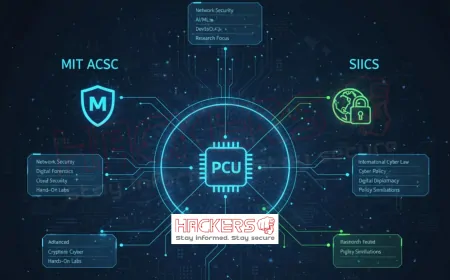Step-by-Step Roadmap to Prepare for the CKA Exam
Kubernetes is transforming the way we deploy and manage applications in the cloud, and the Certified Kubernetes Administrator (CKA) exam is your chance to prove you’ve got what it takes to master this powerful platform. Offered by the Cloud Native Computing Foundation (CNCF), the CKA certification validates your ability to manage Kubernetes clusters, a skill that’s in high demand as businesses embrace cloud-native technologies. Preparing for the CKA can feel daunting, especially for beginners, but with a clear roadmap, you can approach the exam with confidence and come out on top. In this guide, we’ll walk you through a step-by-step roadmap to prepare for the CKA exam, designed to be beginner-friendly yet thorough. From understanding the syllabus to practicing hands-on tasks, we’ll cover everything you need to succeed, all in a simple, human tone. Whether you’re new to Kubernetes or looking to polish your skills, let’s get started on your path to becoming a certified Kubernetes administrator!

Table of Contents
- Why Prepare for the CKA Exam?
- Understanding the CKA Exam
- Step 1: Learn the Basics of Kubernetes
- Step 2: Study the CKA Syllabus
- Step 3: Set Up a Practice Environment
- Step 4: Master Key kubectl Commands
- Step 5: Practice with Hands-On Labs
- Step 6: Focus on Troubleshooting
- Step 7: Simulate Exam Conditions
- Key Resources for CKA Preparation
- Additional Tips for Success
- Conclusion
- Frequently Asked Questions
Why Prepare for the CKA Exam?
The CKA certification is a game-changer for cloud engineers, DevOps professionals, and system administrators. It proves you can manage Kubernetes clusters, a critical skill as companies like Google, Amazon, and Netflix rely on Kubernetes to run their applications. The exam tests practical skills, making it a true measure of your ability to handle real-world cloud infrastructure challenges. Earning the CKA boosts your employability, increases your salary potential, and establishes you as a trusted expert in the cloud-native world.
With a structured preparation plan, you can master the skills needed to pass the exam and unlock exciting career opportunities. This roadmap will guide you every step of the way.
Understanding the CKA Exam
The Certified Kubernetes Administrator (CKA) exam, offered by the CNCF, is a two-hour, hands-on test that evaluates your ability to manage Kubernetes clusters. Conducted in a live Kubernetes environment, the exam requires you to complete 15–20 tasks, such as setting up clusters, deploying applications, and troubleshooting issues. The exam covers five key domains:
- Cluster Architecture, Installation, and Configuration (25%)
- Workloads and Scheduling (15%)
- Services and Networking (20%)
- Storage (10%)
- Troubleshooting (30%)
You’ll use the kubectl command-line tool and have access to the official Kubernetes documentation during the exam. A passing score is 66% or higher.
Step 1: Learn the Basics of Kubernetes
Before diving into the CKA syllabus, build a solid foundation in Kubernetes concepts. If you’re new to Kubernetes, start with these key ideas:
- What is Kubernetes? It’s an open-source platform for managing containerized applications, automating tasks like deployment and scaling.
- Key Components: Understand pods (the smallest deployable unit), nodes (servers in the cluster), and the control plane (manages cluster operations).
- Containers: Learn how containers package applications and their dependencies, using tools like Docker.
- Basic Commands: Get familiar with
kubectl getto list resources andkubectl createto deploy applications.
Use free resources like the Kubernetes documentation (kubernetes.io/docs) or introductory videos on YouTube to grasp these basics.
Step 2: Study the CKA Syllabus
The official CNCF CKA curriculum is your roadmap for preparation. It outlines the five domains and specific tasks you’ll be tested on. Here’s a quick overview:
- Cluster Architecture: Setting up clusters with kubeadm, configuring nodes, and ensuring high availability.
- Workloads: Managing pods, deployments, and stateful sets for application deployment.
- Networking: Configuring services, ingress, and network policies for communication.
- Storage: Setting up persistent volumes and storage classes for data management.
- Troubleshooting: Diagnosing and fixing issues with pods, nodes, and networking.
Download the curriculum from the CNCF website and use it to prioritize your study plan, focusing on high-weighted domains like troubleshooting (30%) and cluster architecture (25%).
Step 3: Set Up a Practice Environment
The CKA is a hands-on exam, so you need a practice environment to experiment with Kubernetes. Here are beginner-friendly options:
- Minikube: A lightweight tool to run a single-node Kubernetes cluster on your laptop. Install it and run
minikube startto get started. - Kind (Kubernetes in Docker): Creates multi-node clusters using Docker containers, great for testing cluster setups.
- Cloud-Based Sandboxes: Use free platforms like Killercoda or Play with Kubernetes for browser-based practice without local setup.
Setting up your own environment helps you practice real-world tasks, like configuring clusters or deploying pods, in a safe space.
Step 4: Master Key kubectl Commands
The kubectl command-line tool is your primary tool for the CKA exam. Memorizing key commands will save you time. Focus on these:
kubectl get: Lists resources like pods, nodes, or services.kubectl create: Creates resources like deployments or services from YAML files.kubectl apply: Applies configuration changes to resources.kubectl describe: Provides detailed information about resources for troubleshooting.kubectl logs: Views logs for debugging pod issues.
Practice these commands in your lab environment and learn to write YAML files for resources like pods and services, as they’re common in the exam.
Step 5: Practice with Hands-On Labs
Hands-on practice is critical for the CKA, as the exam tests practical skills. Use these lab platforms to build experience:
- KodeKloud: Offers CKA-specific labs with scenarios like deploying applications and configuring networking. Includes practice exams.
- Killercoda: A free, browser-based platform with interactive Kubernetes labs for tasks like cluster setup and troubleshooting.
- Linux Foundation CKA Course: Includes labs designed for the exam, covering all domains.
- Minikube or Kind: Create your own labs to practice tasks like setting up storage or debugging pods.
Spend at least 60% of your study time in labs to build muscle memory for exam tasks.
Step 6: Focus on Troubleshooting
Troubleshooting is the largest domain (30%), so dedicate extra time to it. Practice these skills:
- Debugging Pods: Use
kubectl describe podandkubectl logsto identify why a pod is failing. - Cluster Issues: Simulate node failures or API server problems in your lab and fix them.
- Networking Problems: Practice diagnosing service or ingress misconfigurations.
- Log Analysis: Learn to read logs from cluster components like kubelet or etcd.
Create failure scenarios in your lab, like crashing pods or broken services, to hone your debugging skills.
Step 7: Simulate Exam Conditions
The CKA’s two-hour time limit is a challenge, so practice under exam-like conditions:
- Time Yourself: Set a two-hour timer and complete a set of practice tasks from KodeKloud or Killercoda.
- Use Documentation: Practice navigating the Kubernetes documentation quickly, as it’s allowed during the exam.
- Prioritize Tasks: Focus on high-point tasks first, bookmarking complex ones to return to later.
- Simulate the Environment: Use a terminal-based lab to mimic the exam’s browser-based Kubernetes cluster.
Regular timed practice will help you work efficiently under pressure.
Key Resources for CKA Preparation
Here’s a table summarizing the best resources for CKA preparation:
| Resource | Type | Cost | Best For |
|---|---|---|---|
| CNCF CKA Curriculum | Documentation | Free | Understanding exam scope |
| Kubernetes Documentation | Documentation | Free | Learning Kubernetes concepts |
| KodeKloud CKA Course | Online Course | Paid | Structured learning and labs |
| Killercoda | Interactive Labs | Free | Hands-on practice |
| Minikube | Local Cluster | Free | Local practice environment |
Additional Tips for Success
Beyond the steps above, these tips will boost your preparation:
- Join a Community: Engage with Kubernetes communities on Slack, Reddit, or CNCF forums for tips and support.
- Create a Study Schedule: Dedicate 2–3 months, with daily practice sessions focusing on different domains.
- Learn YAML Basics: Many tasks require writing or editing YAML files, so practice creating resources like pods and services.
- Stay Calm During the Exam: If you get stuck, move on to the next task and return later to avoid wasting time.
Conclusion
Preparing for the Certified Kubernetes Administrator (CKA) exam is a rewarding journey that equips you with in-demand skills for managing cloud-native infrastructure. By following this step-by-step roadmap learning Kubernetes basics, studying the syllabus, setting up a practice environment, mastering kubectl, practicing in labs, focusing on troubleshooting, and simulating exam conditions you’ll be well-prepared to pass the exam. With resources like KodeKloud, Killercoda, and the Kubernetes documentation, you can build the practical skills needed to succeed. Start your preparation today, stay consistent, and take the first step toward becoming a certified Kubernetes administrator!
Frequently Asked Questions
What is the CKA exam?
The Certified Kubernetes Administrator (CKA) exam is a CNCF certification that tests your ability to manage Kubernetes clusters.
How long is the CKA exam?
It lasts two hours and includes 15–20 hands-on tasks.
Is the CKA exam beginner-friendly?
Yes, with basic knowledge of containers and Linux, beginners can prepare with dedication.
What does the CKA exam cover?
It covers cluster architecture, workloads, networking, storage, and troubleshooting.
What is the passing score for the CKA?
You need a score of 66% or higher to pass.
Can I use documentation during the CKA exam?
Yes, the official Kubernetes documentation is allowed.
What is kubectl?
kubectl is a command-line tool for managing Kubernetes clusters.
How long should I prepare for the CKA?
Most candidates spend 2–3 months preparing, depending on experience.
Are there free resources for CKA preparation?
Yes, Kubernetes documentation, Killercoda, and Minikube are free.
What is a Kubernetes cluster?
A Kubernetes cluster is a group of nodes that run containerized applications, managed by Kubernetes.
How do I set up a practice environment?
Use tools like Minikube, Kind, or cloud-based sandboxes like Killercoda.
What are the CKA exam domains?
Cluster architecture (25%), workloads (15%), networking (20%), storage (10%), and troubleshooting (30%).
Is the CKA exam hands-on?
Yes, it’s a performance-based exam in a live Kubernetes environment.
What is troubleshooting in the CKA exam?
Troubleshooting involves diagnosing and fixing issues like pod failures or networking problems.
Can I take the CKA exam online?
Yes, it’s proctored online with a stable internet connection.
What is a pod in Kubernetes?
A pod is the smallest deployable unit in Kubernetes, running one or more containers.
How do I master kubectl commands?
Practice commands like kubectl get, kubectl create, and kubectl describe in a lab.
Are practice labs necessary for the CKA?
Yes, hands-on practice in labs is essential for mastering exam tasks.
What is the CNCF?
The Cloud Native Computing Foundation (CNCF) promotes cloud-native technologies and offers certifications like CKA.
Does the CKA expire?
The CKA is valid for three years, after which recertification is required.
What's Your Reaction?









































































